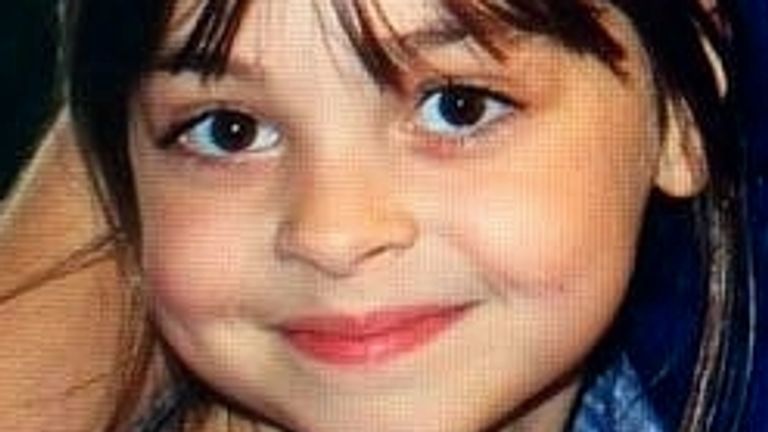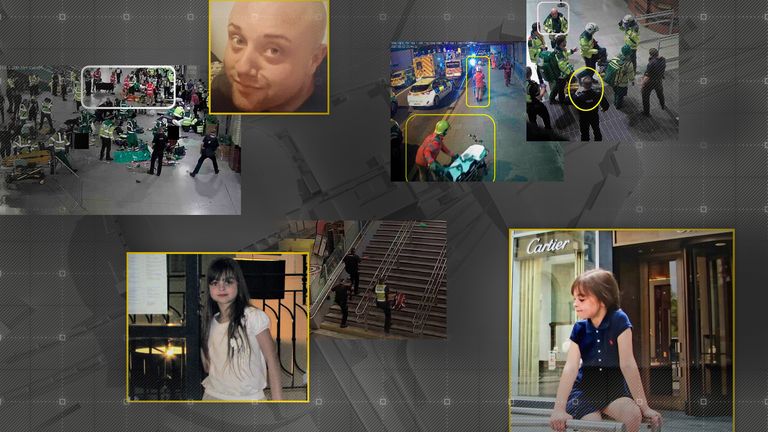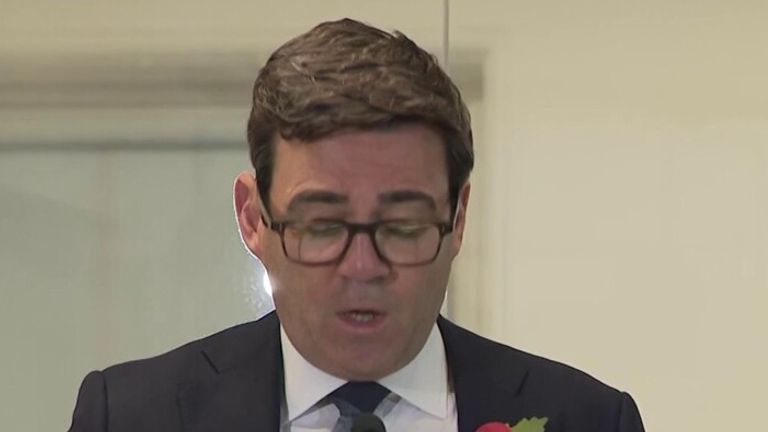The father of an eight-year-old girl who died in the Manchester Arena bombing has rejected the apologies of emergency services for their failures in responding to the attack.
Andrew Roussos told Sky News he believes "100%" that his "fighter" daughter Saffie-Rose would have survived had the emergency response not been inadequate.
Saffie was the youngest victim of the atrocity, in which 22 innocent people died in a suicide bombing at an Ariana Grande concert in May 2017.
An inquiry examining the emergency response to the attack found that "significant aspects... went wrong" and one victim, John Atkinson, would likely have survived had it not been for those "inadequacies".
The report also found there was a "remote possibility" that Saffie could have survived had she received "different treatment and care".
Responding to the report, Mr Roussos said: "We had to fight for this. For the last two years we've been fighting.
"We know Saffie as a person - she would do everything she possibly could to stay alive, and she did.
"She was alive nearly an hour after detonation. She was talking, she was sipping water, she understood what was happening.
"Saffie did all she could to survive but didn't get that chance to survive.
"A human spirit goes a long way in this. And Saffie hung in there the best she could for a chance to survive.
"And we believe 100% that if she got that chance, she would have survived."
'She would fight to the end'
Asked if he accepted the apologies of emergency services, he replied: "No, I don't accept apologies.
"You know, what I do expect is for them to be honest and put their hands up, particularly throughout the inquiry, and admit to the failings because without admitting to the failings, how can you change for the future?
"Now I've heard for the last two years, excuse after excuse, that that night went well - but it didn't go well."
Asked if he believed Saffie would have survived had the emergency response been better, he replied: "100%… because she's a fighter like her mum. She would fight to the end."
Mr Roussos has previously described the emergency response as "shameful" and "inadequate", with some experts telling the inquiry that Saffie could have survived had the response been different.
However Sir John Saunders, chairman of the Manchester Arena Inquiry, concluded that "there was only a remote possibility that she could have survived with different treatment and care".
"On the evidence that I have accepted, what happened to Saffie-Rose Roussos represents a terrible burden of injury," he said.
"It is highly likely that her death was inevitable even if the most comprehensive and advanced medical treatment had been initiated immediately after injury."
What happened to Saffie?
The inquiry heard that Saffie had received tickets to the Ariana Grande concert as a Christmas gift and was ecstatic to be going to see her "idol".
She was holding her mother's hand at the end of the concert when they entered an area known as the City Room where Salman Abedi detonated his bomb.
Saffie was about five metres from Abedi when the bomb was detonated.
She remained in the City Room for 26 minutes, during which she time she drifted in and out of consciousness but she was able to give her name to a member of the public who helped her.
Shortly before 11pm, police officers and two members of the public placed Saffie onto an advertising hoarding that was used as a makeshift stretcher.
She was still conscious as she was carried out of the City Room, down the stairs, through a tunnel and onto Trinity Way where an ambulance arrived just after 11pm.
Five minutes later, Saffie was placed into the ambulance and her level of consciousness "fluctuated", the inquiry heard.
For the next 11 minutes, Saffie was given emergency care in the back of the ambulance and at one stage, she briefly spoke.
The ambulance left Trinity Way for the Royal Manchester Children's Hospital at 11.17pm - 46 minutes after the bomb exploded - and the journey took six minutes.
Saffie was treated by a trauma team in the hospital's resuscitation room and went into cardiac arrest at about 11.26pm.
She was given CPR but was pronounced dead at 11.40pm.
Saffie's death was 'complex issue'
The inquiry chairman said he accepted expert evidence that Saffie's death was caused by multiple injuries she suffered in the explosion.
But he added that whether those injuries made Saffie's death "inevitable" was a "complex issue".
There was "significant disagreement" between experts on the cause of Saffie's death, Sir John said.
Some experts "ultimately considered that there was no possibility" that Saffie would have survived "whatever treatment she had received", he said.
Others argued that survival was "not an impossibility with the best treatment", he added.
A post-mortem examination on Saffie identified 69 external injuries in addition to internal wounds, including injuries to her lungs and liver and internal bleeding.
A panel of "blast wave" experts, using the post-mortem report, photos and a computerised scan, identified that Saffie suffered a total of 103 injuries and stated: "Graphically, this can be described as equivalent to the energy of more than 15 handgun bullets."
Read more:
How emergency crews responded to arena bombing
Security failings that led to Manchester attack
Sir John said that while he accepted the blast wave panel of experts were right about the nature and extent of Saffie's injuries, he added: "I do not consider that the evidence enables me to say that she had absolutely no chance of survival if the most comprehensive and advanced medical treatment had been initiated immediately after injury.
"I cannot exclude the remote possibility that Saffie-Rose Roussos would have survived, notwithstanding the severity of her injuries, if she had received treatment from an experienced consultant in pre‑hospital emergency medicine immediately, followed by swift evacuation to hospital and expert treatment there.
"I make clear that what I am postulating is a remote possibility of survival.
"On the evidence that I have accepted, what happened to Saffie-Rose Roussos represents a terrible burden of injury. It is highly likely that her death was inevitable even if the most comprehensive and advanced medical treatment had been initiated immediately after injury."
Saffie's parents 'pushed to get answers'
Lawyers representing Saffie's family said the "damning report reveals what the families knew all along, that all the organisations meant to protect their loved ones failed on an enormous and unfathomable scale".
Nicola Brook, a solicitor from Broudie Jackson Canter, said: "Saffie's parents Andrew and Lisa have pushed to get answers about what happened to their beautiful daughter over five and a half incredibly traumatic years.
"After initially believing the blast had killed Saffie instantly, the pain of that loss was compounded by learning that she had lived for over an hour."
In a joint news conference after the report, Greater Manchester Police, British Transport Police, Greater Manchester Fire and Rescue and North West Ambulance Service all apologised for their response to the bombing.
GMP chief constable Stephen Watson said the force's "failings were significant" on the night of the attack.
"We failed to plan effectively and the execution of that which was planned was simply not good enough," he said.
"Our actions were substantially inadequate and fell short of what the public have every right to expect, and for this, I apologise unreservedly."
https://news.google.com/__i/rss/rd/articles/CBMihQFodHRwczovL25ld3Muc2t5LmNvbS9zdG9yeS9tYW5jaGVzdGVyLWFyZW5hLWJvbWJpbmctZmF0aGVyLW9mLWdpcmwtOC13aG8tZGllZC1yZWZ1c2VzLXRvLWFjY2VwdC1lbWVyZ2VuY3ktc2VydmljZXMtYXBvbG9naWVzLTEyNzM3NDY30gGJAWh0dHBzOi8vbmV3cy5za3kuY29tL3N0b3J5L2FtcC9tYW5jaGVzdGVyLWFyZW5hLWJvbWJpbmctZmF0aGVyLW9mLWdpcmwtOC13aG8tZGllZC1yZWZ1c2VzLXRvLWFjY2VwdC1lbWVyZ2VuY3ktc2VydmljZXMtYXBvbG9naWVzLTEyNzM3NDY3?oc=5
2022-11-03 19:18:45Z
1631667548




Tidak ada komentar:
Posting Komentar